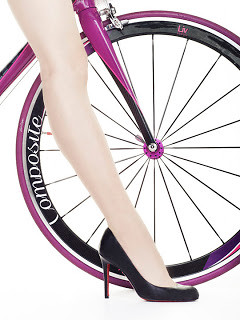
A few years ago I wrote a small article--one of my earliest-- in regard to Giant's Liv Giant line of women specific bicycles and related products. The marketing campaign at that time--the one from which I found the title picture of this post-- featured a whole assortment of sizzling glamor shots depicting a menagerie of pixie-waif models painted in couture make-up, exquisitely styled hair, wrapped in flowing designer gowns, and capped with nine-inch heels. The models were on boats and, in one case, seemingly out beyond the Dune Sea, with the occasional Giant branded downhill mountain bike or road bike in partial view.
The Liv/Giant project was the pet project of Bonnie Tu, Giant CFO, who enthusiastically took to the cycling press to promote her vision of women's cycling.
“To get more women on the road, we have to get them to think of these things as accessories... Natural, everyday accessories, like handbags."-- Bonnie Tu, Giant CFOImagine if the above statement had been uttered by a man.... Being a woman does not excuse Bonnie Tu from overt sexism.
"Obstacles still exist: Asian women don’t want to get a tan from being outside and they fear looking masculine on a bike. But with a focus on fashion and lifestyle, Giant’s boutique is making inroads with upper-class, executive women, said Tu while giving BRAIN publisher Marc Sani and I a tour the day before the Taipei Cycle Show."--Bonnie Tu, Giant CFO
"What she’s
found: “Men are concerned more
with tech and performance. Females take technology for granted — it’s important, and they assume that they are getting the best. But as women, we believe we are entitled to something chic, beautiful, and distinctive. We believe design should be better. We care about the total look.” --Bonnie Tu, Giant CFO(2016)
Bonnie Tu presumptuously claims to be the "godmother" of Women's cycling and yet I can't help but feel she views Taiwanese women through the chauvinistic and dismissive lens shared by so many men. Although many women (and men for that matter) in Taiwan (and elsewhere) buy expensive name brands and buy into modern materialism, Giant's concept feels even more awkward and patronizing considering the new roles of women in contemporary Taiwanese society... including Bonnie Tu, who holds the deputy post in one of the nation's largest and most successful companies. Compared to many countries around the world, including the United States, it is not uncommon for women in Taiwan to excel to become leaders in their respective fields and vocations. Taiwan has already had a female vice president and may very well have a female president or at least presidential nominee in the near future. Women not only hold high positions in politics, but also in every major vocation in Taiwan. Women in Taiwan have taken the agency to plot their own lives and careers to pursue a variety of interests. I am always surprised by the great plurality I have experienced in Taiwan. This is why I am so puzzled that Giant would reduce women's cycling to "an accessory, like a handbag". This is an insult to all the strong, intelligent and capable women out there who do not need to be coerced into buying a bike just to go with a good pair of pumps. Women in Taiwan are perfectly capable of buying a bike for any number of intelligent reasons, and do so.I wrote a follow-up with a little more insight into the problem:
" under capitalism, patriarchy is structured so that sexism restricts women's behavior in some realms even as freedom from limitations is allowed in other spheres. The absence of extreme restrictions leads many women to ignore the areas in which they are exploited or discriminated against; it may even lead them to imagine that no women are oppressed"-- bell hooksIn the wake of that first article I learned that Bonnie Tu and several high ranking decision makers at Giant had, in fact, read my article (I honestly felt flattered) and I learned they had actually discussed my observations, but they felt steadfast in their decision to move forward with their marketing campaign--a campaign that served to depict women as sexualized objects too weak and too insipidly stupid to not only dress appropriately for cycling, but to not even be able to feature them using a bicycle. Yes, the women in the advertising were not even pictured using the products they were hired to sell. I was disgusted by the blinding arrogance in the upper echelons of a company where nobody dared to step up and point out such a disastrously wrongheaded mindset for such a forward thinking company.
"All major brands claim they design specifically for women, but it’s not true. It means something when I say I’m the godmother — nobody should doubt that our women’s bikes are designed for women by women."--Bonnie TuThat was back in 2010.
The bicycle is one of the most egalitarian inventions to come out of the machine age. It is a great equalizer that has been leveraged to not just provide physical mobility across the strata of age and gender, but it has also provided socioeconomic mobiliy and empowerment to the powerless. The WorldBank even commissioned a report on the impact of transportation and empowerment of women. So it is a shame to see how it is marketed.
One of the most advocated interventions by development agencies has been provision of bicycles in the rural areas. Though it might seem a positive, benignant intervention on surface, a little unearthing of the gendered aspect of bicycle usage will reveal that many cultures do not accept such movement of women primarily due to rigid culture underpinnings in women’s movement and its representation. Overton (1996) documents a case in rural Mozambique where bicycles that were distributed to poor village women to alleviate their extreme transport burdens were taken from them by their husbands or other male relatives, who often only used them for recreational and status purposes.
Lee Rodgers boils it down:
“The men get all the glory and TV coverage as they are doing a ‘proper job’,” she writes, “while the girls are ‘allowed’ to be there on the day. That would be sexual discrimination by design. The rewards would follow the coverage, so the men would get the prizes and the girls some token gifts. Welcome to the reality in the world of elite cycling where sexism is by design. And cycling is not alone.
“When challenged, those at the top of these sports are well versed in the platitudes they need to put out to deflect the temporary criticism. A well-crafted statement of intent, a desire to rectify; but the reality is decades of inaction. Sexism spins all the way down from the top to the bottom. Somewhere in the middle of this are Shane Sutton and Jess Varnish.”
She’s right, and anyone who would argue against is nothing less than stupid or willfully misogynistic – or both, as the two do both go hand in hand. What will happen here, once the initial hullabaloo has died down (and it wasn’t exactly a cacophonous din in the first place), is absolutely nothing. Sutton will retain his job, Varnish will be labeled a trouble maker as Cooke was, and the world will trundle on as before.When I think about the gendered state of cycling and when I think of cycling's non-gendered potential, I see no difference between the opinions of Bonnie Tu, Shane Sutton and the men of Mozambique. They are all misogynists. Like the men from Mozambique, Bonnie Tu wants to reduce the bicycle and therefore the woman, into a mere status symbol, a tool of recreation, and an image to be consumed by a male. Giant's marketing scheme is aimed entirely at the male gaze, not the female cyclist. Shane Sutton's views are those of the consumer. He wants to consume the female cyclist, use her for her powers as long as she is useful to him, and then disempower her by separating her from the source of her power and mobility so that she can assume a gendered social role.
As I go back, six years later, I am pleased to see that someone more important than myself has gotten ahold of Giant's ear and redirected Liv/Giant toward a more inclusive culture of what women's cycling can be. UPDATE: (The voice comes from Mark Stocker's DDG agency in Taipei...read between the lines here.) Giant's new website is full of women enjoying almost every aspect of cycling and actually using the products. These are athletic women, these are independent women, these are muscular women, these are woman with an entire range of identities; mothers, daughters, wives, people, athletes and cyclists. These are more like the people I see on the bicycle. The next boundary to break might be age. There are no senior cyclists pictured.
Over the past month I have been involved with two solo tours of Taiwan undertaken by two different and inspiring women. Neither of them were in gowns and make-up. They were covered in road grit like everyone else.
My point is, if over the course of a few years Giant is able to see its erroneous thinking, and reimagine how the company imagines women in cycling... then why can't the rest of the sport and industry make the same choice. Of course, I am not going to believe the change in heart has anything to do with anything other than good business sense, but even in the shrewd world of making money it is evident that bringing women's cycling on par with the men's sport, is simply good business.
Giant is not perfect by any means, and they have numerous other issues, but this is one case where being Giant did not stop them from making some serious changes in realigning themselves with the realities of its customers without demeaning them. Now if Ms. Tu would kindly step away from the mic.

